One of the things that I believe in passionately is that personal characteristics should not be a barrier to participating in any aspect of life. This belief is what led me and my colleagues to set-up Women in HPC, as our gender affects us personally. However, I am also very aware that gender is just one of many characteristics that can result in groups being marginalised in society and the workplace.
In 2015 I was delighted that EPSRC (the UK Engineering and Physical Sciences Research Council), who support the ARCHER supercomputer and also the work of Women in HPC, asked EPCC as the Computational Science and Engineering (CSE) providers of the ARCHER service, to consider improving diversity in other ways. One of the outcomes of this has been the Faces of HPC project which is an extension of the ARCHER Outreach and training activities.
Faces of HPC is all about recognising that no personal characteristic, be it gender, ethnicity, age, family or anything else, should be a barrier to using supercomputers. The field of HPC is exciting and needs all available talent, and we should not be excluding groups because of social expectations. However, although the majority of people are very welcoming, it is our unconscious/implicit bias that inhibits progression of people, both by others and sometimes by the pressure the individuals put on themselves which manifests in concepts such as ‘stereotype threat’. This is a complex problem to solve, and with a whole area of social science dedicated to understanding it, but what we do know is that to address bias’ and an individual’s stereotype threat, it is important to show the community the wide variety of people that do already contribute.
The interviews and historical biographies showcased by ‘Faces of HPC’ aim to do precisely that: showcasing the true diversity of those already in HPC. We cover inspirational historical figures from Ada Lovelace and Alan Turing to postgraduate students just starting out in HPC. Every single one of these people is inspiring to someone, and it is important that we have the full variety of individuals.
However, I’m also sure we are missing not only great examples of those in HPC, but also key demographics. If you are interested in being interviewed, please do drop the team an email at: info@hpc-diversity.ac.uk. We look forward to hearing from you!
By: Toni Collis
[one_third valign=”top” animation=”none”]

[/one_third]
[two_third_last valign=”top” animation=”none”]
Toni Collis is co-founder of WHPC and an Applications Consultant in HPC Research and Industry, providing consultancy and project management on a range of academic and commercial projects at EPCC, the University of Edinburgh Supercomputing Centre.
Toni has a wide-ranging interest in the use of HPC to improve the productivity of scientific research, in particular developing new HPC tools, improving the scalability of software and introducing new programming models to existing software. Toni is also a consultant for the Software Sustainability Institute and a member of the ARCHER team, providing ARCHER users with support and resources for using the UK national supercomputing service as effectively as possible. In 2013 Toni co-founded Women in HPC (WHPC) as part of her work with ARCHER. WHPC has now become an internationally recognized initiative, addressing the under-representation of women working in high performance computing.
Toni is Inclusivity Chair and a member of the Executive committee for the SC17 conference. Toni is also a member of the XSEDE Advisory Board and has contributed to the organization and program of a number of conferences and workshops over the last five years.
[/two_third_last]

